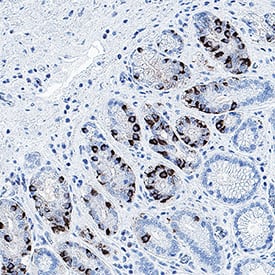Human CCK Antibody
R&D Systems, part of Bio-Techne | Catalog # MAB11040

Key Product Details
Species Reactivity
Applications
Label
Antibody Source
Product Specifications
Immunogen
Accession # P06307
Specificity
Clonality
Host
Isotype
Scientific Data Images for Human CCK Antibody
CCK in Capan-2 Human Cell Line.
CCK was detected in immersion fixed Capan-2 human pancreatic adenocarcinoma cell line (positive staining) and Daudi human Burkitt's lymphoma cell line (negative staining) using Rabbit Anti-Human CCK Monoclonal Antibody (Catalog # MAB11040) at 3 µg/mL for 3 hours at room temperature. Cells were stained using the NorthernLights™ 557-conjugated Anti-Rabbit IgG Secondary Antibody (red; Catalog # NL004) and counterstained with DAPI (blue). Specific staining was localized to cytoplasm. View our protocol for Fluorescent ICC Staining of Cells on Coverslips.CCK in Human Duodenum.
CCK was detected in immersion fixed paraffin-embedded sections of human duodenum using Rabbit Anti-Human CCK Monoclonal Antibody (Catalog # MAB11040) at 3 µg/mL for 1 hour at room temperature followed by incubation with the Anti-Rabbit IgG VisUCyte™ HRP Polymer Antibody (VC003). Before incubation with the primary antibody, tissue was subjected to heat-induced epitope retrieval using Antigen Retrieval Reagent-Basic (CTS013). Tissue was stained using DAB (brown) and counterstained with hematoxylin (blue). Specific staining was localized to cytoplasm in neuroendocrine cells. Staining was performed using our protocol for IHC Staining with VisUCyte HRP Polymer Detection Reagents.Applications for Human CCK Antibody
Immunocytochemistry
Sample: Immersion fixed Capan‑2 human pancreatic adenocarcinoma cell line
Immunohistochemistry
Sample: Immersion fixed paraffin-embedded sections of human duodenum
Formulation, Preparation, and Storage
Purification
Reconstitution
Formulation
Shipping
Stability & Storage
- 12 months from date of receipt, -20 to -70 °C as supplied.
- 1 month, 2 to 8 °C under sterile conditions after reconstitution.
- 6 months, -20 to -70 °C under sterile conditions after reconstitution.
Background: CCK
Cholecystokinin (CCK) is a peptide hormone secreted by the gastrointestinal system that stimulates the digestion of protein and fat. CCK is synthesized and secreted by enteroendocrine cells of the duodenum and acts as a hunger suppressant. CCK participates in several processes such as digestion, satiety, and anxiety. CCK is also found extensively throughout the central nervous system with anxiogenic, panicogenic and hallucinogenic effects. Receptors of CCK are found in the central nervous system specifically in the hippocampus, cerebral cortex, and striatum.
References
Long Name
Alternate Names
Entrez Gene IDs
Gene Symbol
UniProt
Additional CCK Products
Product Documents for Human CCK Antibody
Product Specific Notices for Human CCK Antibody
For research use only

